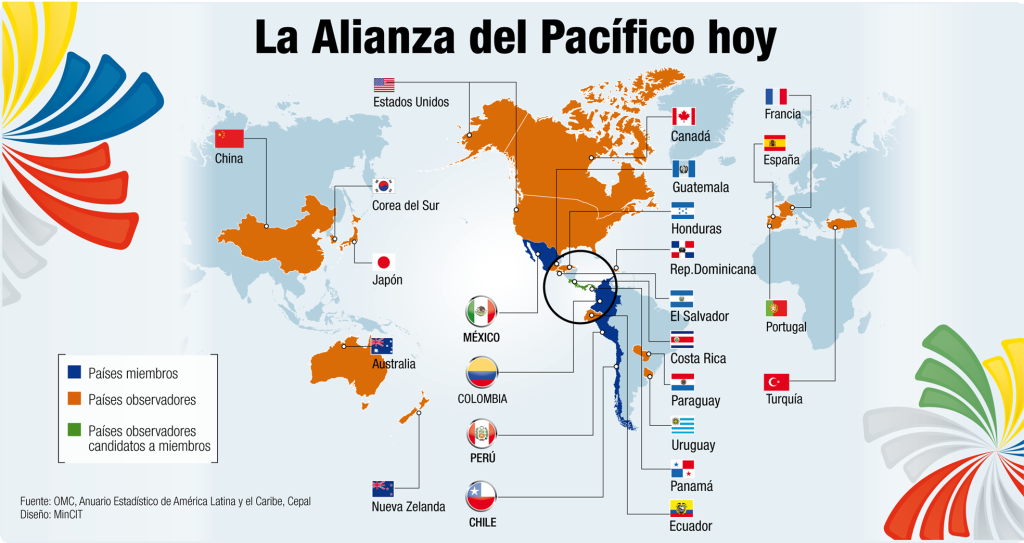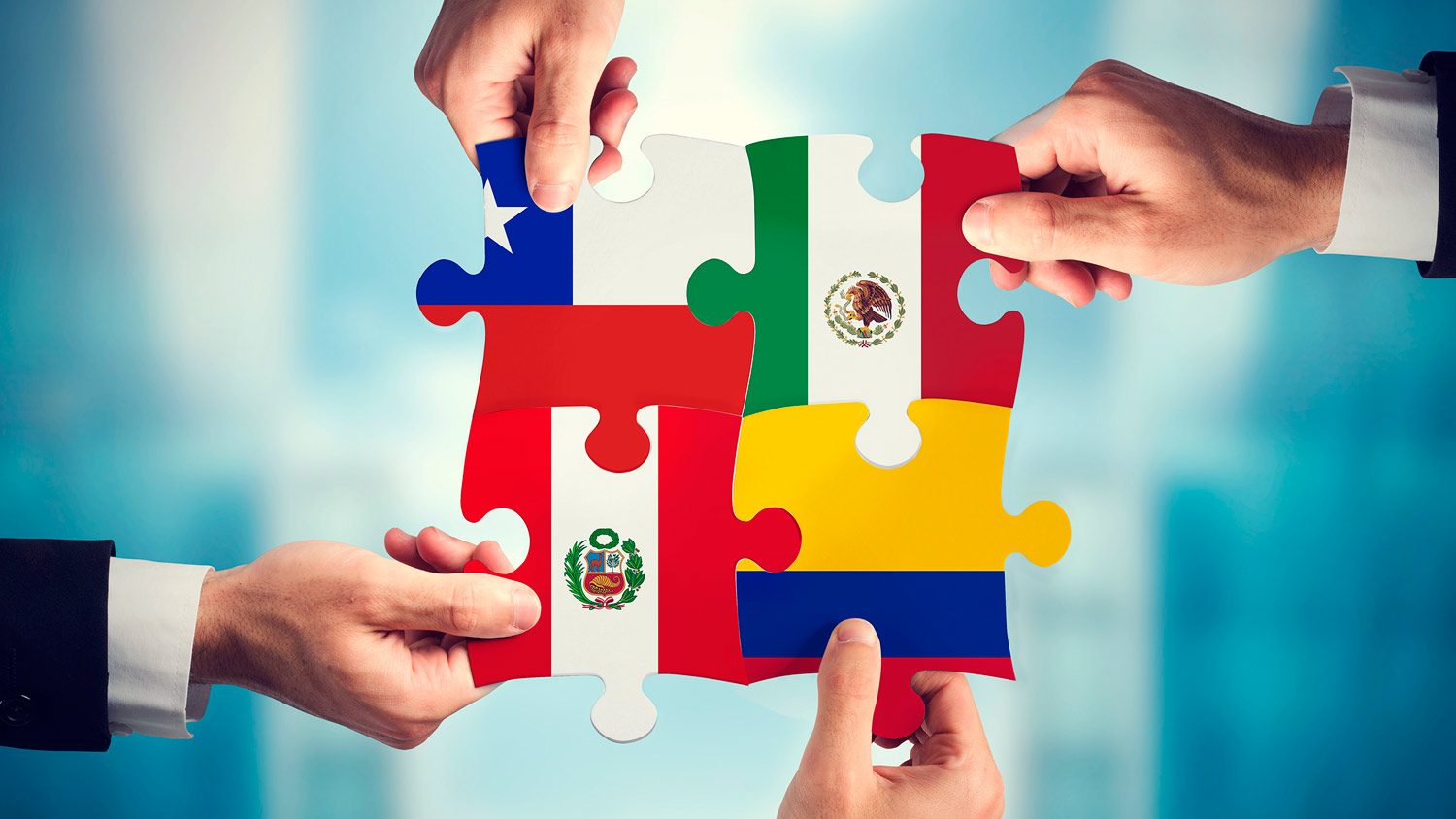Alianza del Pacífico, inclusive growth, innovation and the drive against protectionism

Photo: WTO, ECLAC, MinCIT, panoramical
The Alianza del Pacífico or Pacific Alliance is undergoing a major drive to push for deeper ties and integration in the region and in the Asia-Pacific rim. Why is the strategy so vital for Latam countries and for free trade precepts?
Counter-balancing the current geopolitics of the North
Country Risk Chile analyzes the recent developments and targets being pursued by Alianza del Pacífico to strengthen ties and deepen commercial deals within the region and with the Asia-Pacific rim. To understand the various political architectures in Latam Countries (hence, the difficulties to build a regional bloc) it is necessary to explain the divergence in terms of the pull-push tension between ideology and pragmatism in the region. As result, there is today, within the region, 3 axes of integration: a protectionist MERCOSUR (Argentina, Brazil, Uruguay), revisionist ALBA (Venezuela, Bolivia, Cuba), and open regionalism in Alianza del Pacífico or Pacific Alliance (Mexico, Peru, Colombia, and Chile)
The Pacific Alliance (PA) was established in 2011, as part of an ongoing initiative to strengthen commercial ties to boost sales in the world markets more efficiently and with greater presence. The PA counts on 49 observing countries and is currently working on fast-track process to upgrade candidate members to reach fully-fledged powers. The PA has been playing a key role with the initiative of further liberalizing the economies of the region in view of the recent events in geopolitics, such as the America First policy launched by the new Trump administration in the USA. The drive also responds to a perceived threat of protectionist measures that might affect WTO guidelines ruling international trade agreements worldwide. Secondly, the PA is seizing an opportunity for greater convergence with MERCOSUR, in the light of Argentina's electoral shift to the right with President Macri, who has been keen in upgrading MERCOSUR to converge with the AP, aided by Brazil's readiness to abandon protectionist barriers, and thus help the local economy.
Just recently, May 17, the Head of DIRECON Chile, at the heart of the Foreign Affairs Ministry, Ms. Paulina Nazal, expressed that the PA had moved beyond commercial integration, to include key areas of development such as fostering SME's, breaching the gender gap, advancing the digital agenda, among others. Ms. Nazal remarked that more than 1,400 students from the PA member countries had benefited from scholarship-funded studies in the universities of the bloc.
One particular target set by the PA is helping entrepreneurs and companies to achieve value-added in the global chain of production. Innovation and productivity is one aim that is channeled by helping SME's. According to Ms. Nazal, growth must be inclusive, and SME's should find incentives to that goal. In that line, the PA and ProChile, the entity in charge of promoting Chile abroad have launched the fourth version of LAB4+ scheduled for June 13 2017 where small and medium companies (Pymes) will enjoy a unique opportunity to showcase their products, receive first-class training and coaching as well as get familiar with new technologies and tools to boost their sales.
By Sept 2016 in New York, the PA and ASEAN agreed on a Framework for Cooperation to facilitate trade, SME's, connectivity, among others. By January 2017, the PA organized a forum with ASEAN on the global value chains (GVC) with a commitment to cooperate in areas of technology, education and fostering the learning of ASEAN languages in the PA countries (and vice-versa). By Feb 2016, Ms. Nazal highlighted the necessity to deepen ties with Mercosur in areas of convergence and strive for an increase in the volumes of trade between the Pacific Alliance and Asia. Ms. Nazal pointed to areas of GVC, connectivity, and cooperation.
The TPP that never took off and the opportunity for closer ties.
In 2017, Chile is president pro-tempore of the PA, with it, the drive to lead has gathered momentum. In March 2017, the summit in Viña del Mar, Chile, with the ex-TPP countries, and the presence of China and America's diplomatic officers was a key moment in how the PA, and Chile, in particular, have defined the efforts to sustain free trade and impede protectionist measures. The PA initiative was to foster deals and deepen cooperation with Asia. The ex TPP members devised the way forward to protect free trade and envisage a way to keep the high standards set in the original TPP, while China filled the void in the wake of Trump's decision to pull out from the mega block by signing additional deals with the participating countries.
Conclusions:
Chile has been keen in deepening ties with closer neighboring countries. The initiative has seen a closer relation with Argentina, for example, in the supply of gas for the second year in a row. Chile as the president pro-tempore of the PA is committed to continuing the path of tree trade and commercial integration according to WTO-plus guidelines. LAB4+ is a valuable initiative to correct the structural heterogeneity of Latin American countries. By achieving a greater role, the SME's can achieve added value to their products, provide innovative jobs, and change the economic model into one which is more sustainable and equitable.
All these efforts will help Latam countries reach deeper integration and in conjunction, the region can overcome the excessive dependence on raw material. The emphasis on education as a pillar to achieve this level of innovation with SME's through scholarships and LAB4+ are key strategic moves which should be sustained in the short, medium and long run. Once Trump pulled out of the mega-bloc, ex-TPP countries found an opportunity to strive against protectionism and in favor of inclusive growth.
The Pacific Alliance and Asia: One way to accelerate this process is a new mechanism to be shortly defined in Cali, Colombia, in June, so observing countries can be upgraded to Associate Members and commence negotiations for bilateral deals with the PA.
Soledad Soza, June 9, 2017
